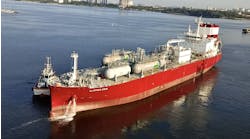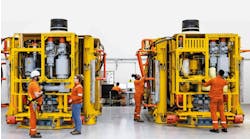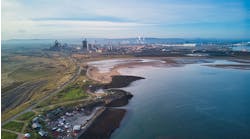ADNOC, Petronas pursuing CCS opportunities offshore Malaysia
Petronas, ADNOC and Storegga have signed a joint carbon capture and storage (CCS) study and development agreement.
The partners plan to examine the CO2 emissions storage capabilities of saline aquifers in the Penyu Basin offshore Peninsular Malaysia and investigate potential construction of associated CCS facilities.
They are targeting a CCS capacity of at least 5 MM metric tons/year by 2030.
The planned program, due to start later this year, includes a CO2 shipping and logistics study, geophysical and geomechanical modeling, reservoir simulation and containment research, and assessing the application of artificial intelligence to enhance storage capacity.
Nora’in Md Salleh, CEO of Petronas CCS Solutions, said the agreement “will potentially allow us to build our capability to develop and de-risk saline aquifers as carbon dioxide storage sites by leveraging on our partners’ expertise and experience in other regions.
“This strategic partnership aligns with Petronas’ overarching goal of establishing Malaysia as a regional CCS hub to serve Asia-Pacific where it may build up the storage capacity through saline aquifers. ADNOC is targeting a carbon capture capacity of 10 MMt/year by 2030.”
The joint venture between PGS, TGS and SLB started a new multiclient 3D seismic project in the Penyu Basin offshore Peninsular Malaysia earlier this year. Ramform Sovereign sailed to the area in March and aimed to acquire about 7,800 sq km of 3D data, finishing the program in July. Processing should be completed in June 2025.
ADNOC acquired a 10.1% stake in London-based CCS developer Storegga in January of this year.



